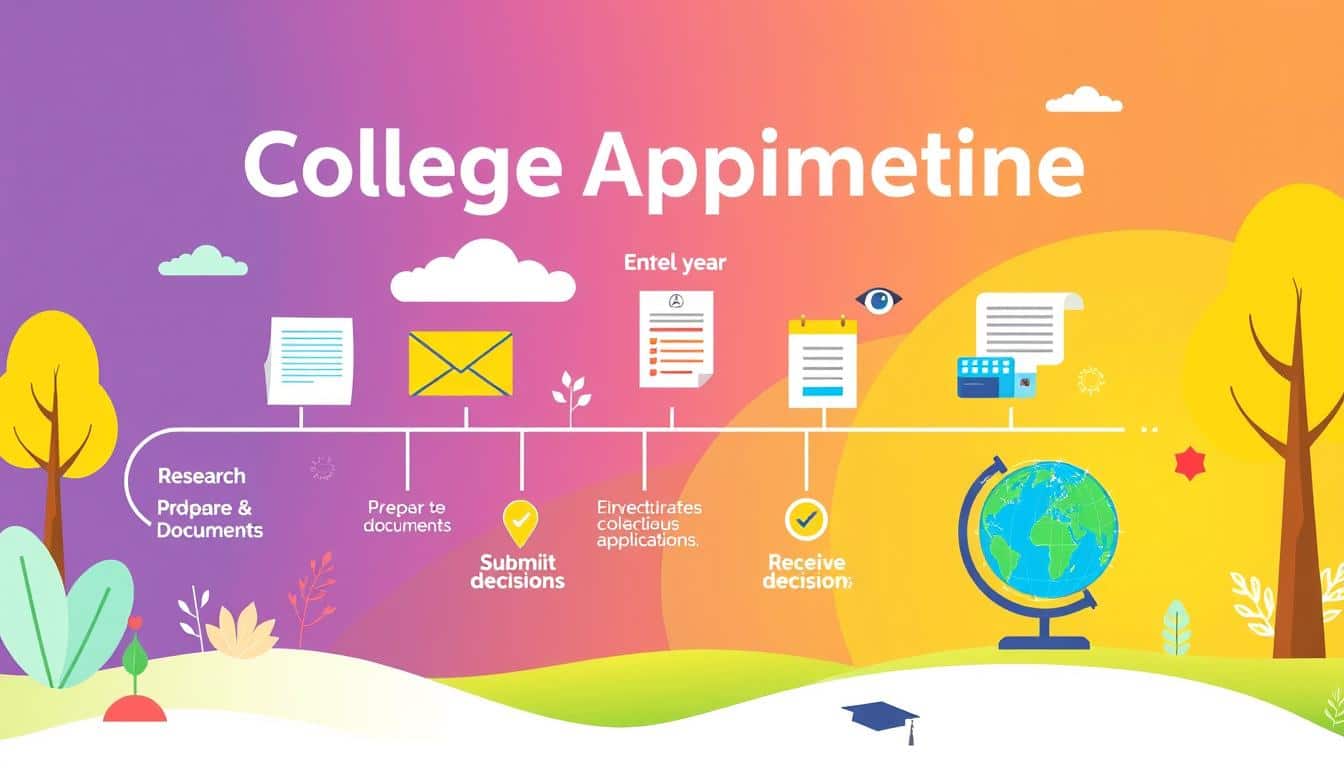Admission Requirements College admissions are a key part of finding the right fit for students. This starts in high school, where grades, test scores, and activities matter a lot. Admission officers look for students who are curious and active to make diverse classes.
This guide covers the main parts of getting into university, like grades, tests, and documents. It also talks about the whole review process. Knowing these points helps students feel more confident when applying to their top colleges.
Key Takeaways
- College admissions focus on finding the right fit for students.
- Grades, test scores, and activities are key in the process.
- Admission officers want students who are curious and active for diverse classes.
- Understanding grades, tests, and the review process is crucial for applying to college.
- This guide gives a detailed look at what you need to know for university admission.
Understanding Admission Requirements Fundamentals
Getting into university means knowing the basics. It’s about checking your grades, test scores, and other documents. Let’s look at what’s important for most schools.
Academic Prerequisites and GPA Requirements
To get into university, you need to finish 15 A-G courses in high school. These include history, English, math, science, and more. You should have a GPA of 3.0 or higher, especially if you’re not from the state.
Standardized Test Scores and Requirements
Most schools want your SAT or ACT scores. Some don’t need them, but many do. The College Board says you should spend 6 to 20 hours studying for your first SAT.
Required Documentation and Transcripts
Universities also need more than just grades and test scores. They want your high school transcript, letters of recommendation, and personal essays. Some programs might ask for extra stuff like portfolios or interviews.
Knowing these basics is key to applying to college. By understanding what schools look for, you can prepare better. This way, you’ll have a good shot at getting into your top choice university.
The College Application Timeline and Process

The college application process is a key part of a student’s education. It starts in the junior year of high school. Students research colleges, attend fairs, and visit campuses to find the right fit.
There are several important parts to the application, like transcripts, test scores, and personal essays. Students can apply through early action, early decision, or regular admission. The Common Application makes applying to many colleges easier.
Financial aid applications, like the FAFSA, have their own deadlines. It’s important to consider these deadlines. Financial aid packages vary, so students and families must choose wisely.
| College | Early Action Deadline | Early Decision Deadline | Regular Decision Deadline |
|---|---|---|---|
| Harvard University | November 1 | November 1 | January 1 |
| Stanford University | November 1 | November 1 | January 2 |
| Massachusetts Institute of Technology (MIT) | November 1 | November 1 | January 1 |
| University of California, Berkeley | November 30 | N/A | January 6 |
| University of Michigan | November 1 | November 1 | January 1 |
The table shows the application deadlines for 5 popular colleges for fall 2025. Each college has its own deadlines. Students need to plan carefully to meet these deadlines.
Finding the right college and applying can be tough. But knowing the application options and deadlines helps. This knowledge boosts students’ chances of getting into their top choices.
Essential Components of University Admission Requirements

When applying to college, it’s key to know what’s important. Letters of recommendation, personal statements, and extracurricular activities are crucial. These elements help show who you are and what you can do.
Letters of Recommendation Guidelines
Letters of recommendation give colleges a peek into your character and abilities. They come from teachers, counselors, or others who know you well. It’s important to pick people who can truly highlight your strengths.
Personal Statement and Essay Requirements
The personal statement and essays let you share your story. They help colleges see you as more than just grades. Use them to show your thinking, creativity, and growth.
Extracurricular Activities and Achievements
Being active in extracurricular activities and achieving goals is important. Colleges look for these to see your leadership and interests. Share how you’ve made a difference in clubs, sports, or service.
By focusing on these key areas, you can make a strong application. It will show your academic skills, personal qualities, and passion for your field.
Understanding the Holistic Review Process

The college admissions process is changing. It now looks at more than just grades and test scores. This holistic review process aims to see how an applicant can contribute to the university community. It wants to create a diverse and inclusive place.
At the core of this holistic admissions approach is the idea that an applicant’s worth goes beyond grades. Colleges now look at an applicant’s background, talents, and experiences. They consider extracurricular activities, leadership roles, and personal essays.
The admissions review process is a detailed look at an applicant’s qualifications. It goes beyond the usual college admissions metrics. This holistic review helps find applicants who can do well in school and social life.
By looking at an applicant’s whole picture, colleges can build a diverse student body. This approach brings together students with different backgrounds and talents. It helps create professionals who can serve diverse populations well.
| Holistic Admissions Practices | Benefits |
|---|---|
| Consideration of academic performance, extracurricular involvement, leadership experiences, personal essays, and letters of recommendation | Enables a comprehensive assessment of an applicant’s potential contributions to the university community |
| Evaluation of an applicant’s background, talents, and perspectives | Fosters a diverse and inclusive campus environment |
| Emphasis on the applicant’s value beyond just academic metrics | Identifies individuals with the qualities and potential to thrive in academic and social settings |
By using the holistic review approach, colleges can make their admissions process more reflective of applicants. This leads to a more diverse, engaged, and enriched student body.
Also Read : A Guide To Finding Everything You Need At The University Bookstore
Conclusion
Understanding college admission requirements is key for students aiming to get into their dream university. This guide has covered what admissions committees look for. This includes your grades, test scores, activities outside of class, and your personal statement. Knowing these requirements helps you stand out in the application process.
College admissions can be tough, but with the right prep, you can increase your chances. Learning about the college admission guide, university requirements, and application tips helps you make smart choices. It’s important to show a complete picture of yourself through your application.
The college admission journey is complex, but you can succeed with the right knowledge. Stay focused, stay organized, and believe in your efforts. Your hard work will lead to success as you start this new chapter in your life.
FAQs
Source Links
- https://www.princetonreview.com/college-advice/college-admissions-guide
- https://www.accreditedschoolsonline.org/resources/college-admissions-guide/
- https://www.collegeessayguy.com/blog/how-to-get-into–university-of-michigan




